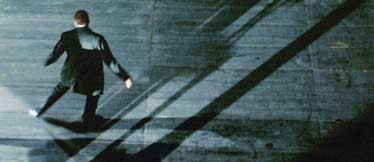
April 29, 2006, by Peter Kirwan
Othello (Munchner Kammerspiele) @ The Royal Shakespeare Theatre
APRIL 29TH 2006 (backdated)
“May be unsuitable for young children. Certain scenes contain strong language which some people may find offensive”.
Not a disclaimer for this blog, but the one sent out prior to the arrival of the first of the international contributors to the Festival – Munchner Kammerspiele from Germany.
This was emphatically NOT for the faint-hearted. Rather than translate Shakespeare’s text into German, the writers had instead written a new version of the play in contemporary language. Language being the operative word, as every swear word I know was used in turn, some to appalling effect, others so often that by the end of the play they felt like polite conversation!
This was “Difficult” Shakespeare, designed to provoke and cause conflict. Two hours straight through on a bare and dimly-lit stage dominated by two grand pianos on top of each other, one black and one white. It was in German with English surtitles, the stage so dark that we could rarely see the actor’s faces, and an astonishingly vicious approach to cutting the play.
I have to be honest, though. I absolutely, 100% loved it. The music made it- throughout, the play was accompanied by an offbeat live jazz score, the pianist using his instrument in every way possible, even leaning inside and banging on the strings. At one moment the actors would be jerking about to the insane rhythms, as if controlled quite literally by the strings of the piano, at others the pianist sang beautifully moving ballads.
Having a white actor, Thomas Thieme, playing Othello allowed the production to bring out another distinction between the two lovers- their age. While Julia Jentsch’s Desdemona skipped about the stage, Othello lumbered to keep up and looked somewhat ridiculous. Their aggressively physical relationship- all over each other at very inappropriate times, like the war council- here betrayed a deep-felt insecurity on both sides: Othello insecure about his age and his ability to satisfy Desdemona, Desdemona about whether she had made the right match, as became clear towards the end as she screamed, swore and threatened to leave Othello.
You might get from that that this wasn’t the traditional demure, saintly Desdemona. Instead, she was a modern girl discovering her sexuality, who would only go so far to placate her lover and wouldn’t accept his final violent treatment of her. She played the child but felt herself to be very much the woman, and so their tragedy became one of miscommunication, of a couple experiencing problems but unable to talk about them, thus leading to destruction.
This was their play. Bianca was cut, and Cassio’s story conflated with Iago’s so that Cassio was in fact having an affair with Bianca, leading to a shattering moment after the offstage murder of Cassio when Iago re-entered with Cassio’s shirt, and proceeded to violently shred it with a knife in front of his wife.
I could really go on about this play all night. A lot of people didn’t like it, and one of the most disheartening things about the night was overhearing one group asking, “Where do we queue to get our money back for THAT rubbish?”, and I can understand why people would react like that. I’ll probably post later about people’s preconceptions of what ‘Shakespeare’ should be, as I think that’s going to have a big bearing on audience figures. It says something, though, that this run was only four performances long, and was far from sold-out when I saw it.
I loved it, though. To me, it was what theatrical Shakespeare is all about, the spirit of the thing, the dynamic relationships between characters, those moments onstage which have the groundlings gasping, sobbing and laughing. It was distant, but at the same time superlatively evocative and emotional, and superb theatre.
No comments yet, fill out a comment to be the first

Leave a Reply